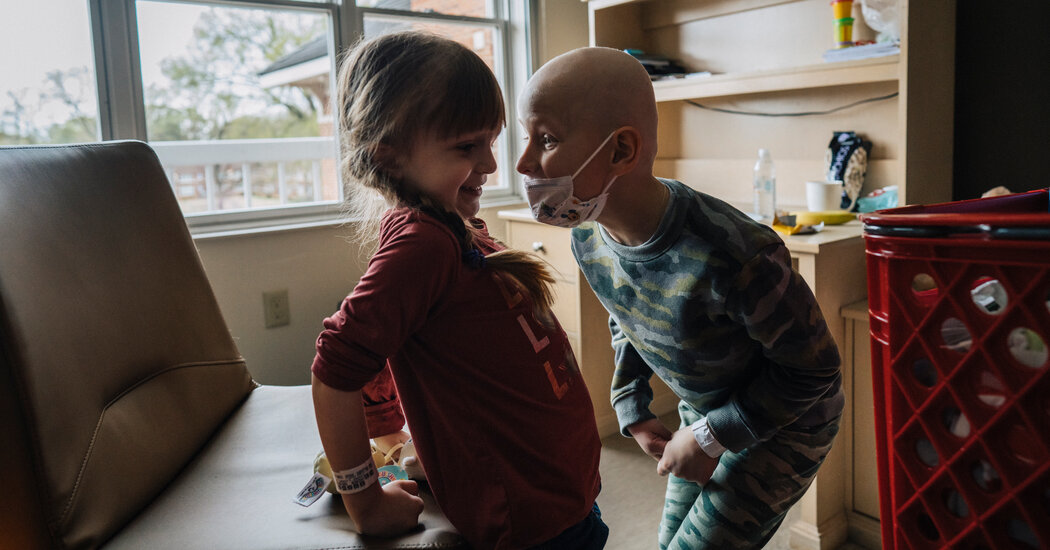Fighting for Her Life, Far From Ukraine
A 5-year-old Ukrainian girl with a brain tumor was one of several children brought for treatment in the United States after their country was invaded by Russia.
MEMPHIS — When Russia invaded Ukraine, Marija Pyzhyk was still worried mainly about her 5-year-old daughter, Khrystyna, who was being treated for a brain tumor. The family lived in Lviv, the western city near Poland, far from the rockets raining down in the east.
Soon, however, Ms. Pyzhyk was informed that the hospital was about to run out of the medication to treat her daughter; she would have to be evacuated immediately for care in another country, the doctor told her.
“I had truly believed we could continue our medical treatment in Ukraine,” Ms. Pyzhyk recalled.
Khrystyna’s condition, optic glioma, a cancer most common in young children, can cause blindness and even death without consistent therapy to shrink or stabilize the tumor. Khrystyna requires daily oral chemotherapy.
On March 16, Ms. Pyzhyk, Khrystyna and her son, Sergei, 10, bid farewell to her husband, Volodymyr, and boarded a bus to Poland, where they joined several other evacuated families with ailing children. While other families were directed to hospitals across Europe, Ms. Pyzhyk and her children were told they would be flown to the United States.
“We are so far from family and friends and our homeland,” Ms. Pyzhyk said this week at a hospital in Memphis, where her daughter is now a patient. She did not hesitate, she said, because Khrystyna’s life depended on it.
Among the millions of displaced Ukrainians are thousands of sick children who could no longer be treated there. More than 400 Ukrainian pediatric cancer patients have passed through Poland en route to medical centers in other countries.
Khrystyna was among eight Ukrainian children who arrived in late March at St. Jude Children’s Research Hospital, an institution specializing in childhood cancer that is funded by private donors. The hospital had set up a triage clinic in Poland to identify children in need of care and place them with partnering hospitals, mainly in Europe.
“If all these children stayed in Ukraine, they were going to die of their disease, complication of the treatment of their disease, or war,” Dr. James Downing, the chief executive of St. Jude, said in an interview.
Pediatric cancer treatment requires a quick succession of drugs with high intensity, he said. “Any interruption of therapy significantly increases risk for failure, relapse and ultimately death from the disease. It’s a timing issue.”
Six days after they had left Ukraine, the Pyzhyks checked into a two-bedroom apartment at Target House, the Memphis hospital’s residential facility, with two suitcases and two small bags.
After a visit to the hospital, during which Khrystyna received vaccinations required before commencing her oral therapy, Dr. Ibrahim Qaddoumi asked his little Ukrainian patient what the Barbie doll she received at the hospital was cooking. “Ukrainian borscht,” an interpreter replied.
On an outing later to an international market with two other families, Ms. Pyzhyk searched for buckwheat and sour yogurt. As they prepared to check out, the owner of the market said they did not need to pay. “I’ve been through war. Two of them,” he said.
At their next stop, an American-style supermarket, they were dazzled by the wide array of produce. At the deli counter, workers offered them samples of salami. “Take your time,” one attendant said.
Ms. Pyzhyk has been regularly preparing Ukrainian dishes at their apartment. But Khrystyna and Sergei most enjoy eating at the hospital cafe, where they can order cheeseburgers, macaroni and cheese and even fried catfish, a Southern classic. Their favorite is chicken strips and fries.
Russia-Ukraine War: Key Developments
Khrystyna is aware that Ukraine is at war, said her mother. “It is impossible for her not to know what is going on. She was exposed to air raid warnings,” she said. “But I don’t think she knows what that means.”
Back home in Lviv, her husband has fretted about what is happening to his family on the other side of the world, but he said in a phone call that his daughter has been brave throughout her yearslong treatment. “My daughter is a strong personality,” he said. “She is a true Ukrainian.”
Khrystyna and Sergei have a close and tender bond. He is his sister’s protector, holding her hand when they enter the hospital, walk to the doctor’s office or sit down for English lessons.
Sergei said he loved his sister from birth. “I felt I had a new friend for life,” he said. “I take care of her, but sometimes we argue like normal people. It never takes too long for us to be friends again.”
He is keenly aware of his sister’s vulnerability. Glioma can affect the eye, and Khrystyna’s left eyelid is half closed; the area above her eye bulges slightly.
Not long after they arrived, Ms. Pyzhyk took her children and Marya, another Ukrainian child, on their first trip to a zoo. They lingered near the giraffes, lions and zebras, in awe.
But by the end of the second week, the reality that they were not on a vacation, and that home was very far away, started to set in.
“Will we fly home today?” Khrystyna asked her mother at dinner, only to burst into tears when she heard the response. Sergei tried to comfort his sister, gently massaging her back.
Check out our Latest News and Follow us at Facebook
Original Source







